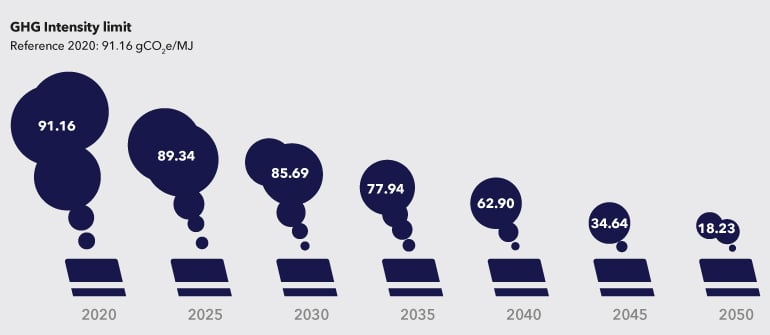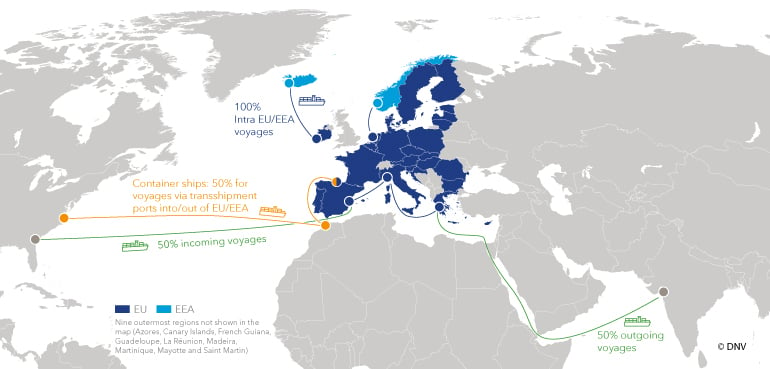What is FuelEU Maritime?
The EU has adopted the FuelEU Maritime regulation to increase the share of renewable and low-carbon fuels in the fuel mix of international maritime transport in the EU.
FuelEU Maritime sets well-to-wake greenhouse gas (GHG) emission intensity requirements on energy used on board ships over 5000 GT trading in the EU and will be implemented from 1 January 2025.
The regulation also requires passenger and container ships to connect to onshore power supplies at major EU ports from 2030, when at berth for more than two hours. This will be extended to all ports with onshore power supply from 2035.
How does FuelEU Maritime work?
FuelEU Maritime sets requirements on annual average GHG intensity of energy used by ships trading in the EU or European Economic Area (EEA), measured as GHG emissions per energy unit (gCO2e/MJ).
GHG emissions are calculated in a well-to-wake perspective, including emissions related to extraction, cultivation, production and transportation of the fuel, in addition to emissions from energy used on board the ship.

Calculations will be set relative to the average well-to-wake fuel GHG intensity of the fleet in 2020 of 91.16 gCO2e per megajoule (MJ). This will start at a 2% reduction in 2025, increasing to 6% in 2030, and accelerating from 2035 to reach an 80% reduction by 2050.

The GHG intensity requirement applies to 100% of energy used on voyages and port calls within the EU or EEA, and 50% of energy used on voyages into or out of the EU or EEA.
 FuelEU Maritime requirements based on percentage of energy used on voyages
FuelEU Maritime requirements based on percentage of energy used on voyages
(Click here to open high-resolution version in a new tab)
What actions need to be taken by shipowners?
In a nutshell:
- Submit a FuelEU Monitoring Plan to an accredited verifier, such as DNV. This plan should outline how you intend to monitor and report emissions for each ship in your fleet. This should be completed by 31 August 2024.
- Start reporting key data related to FuelEU Maritime from 1 January 2025. This data includes fuel consumption, CO2 emissions, and distance traveled.
- Have individual ship’s FuelEU partial reports verified maximum 1 month after change of company.
- Submit the individual ships’ FuelEU reports by 31 January 2026.
- By 30 April 2026, have the compliance balance approved in FuelEU database.
- By 30 June 2026, have the FuelEU Document of Compliance onboard. This is also the penalty payment deadline.
To find out more about how you can comply with FuelEU Maritime, visit the Compliance tab.
How can DNV help with FuelEU Maritime?
DNV is ready to assist shipowners at every stage of their FuelEU Maritime journey. This starts with our user-friendly and efficient FuelEU Monitoring Plan Online Form. This is available to all companies and contains everything that shipowners need to ensure they are fully prepared for the upcoming implementation of FuelEU Maritime.
Verification of FuelEU Emissions Report
As a future accredited verifier for FuelEU Maritime, DNV will offer verification of the FuelEU emissions report from 2026. Our fully digital service has a built-in interface that allows customers to generate a report on compliance with all regulations (EU & UK MRV, IMO DCS and FuelEU Maritime).
Data can be uploaded daily via API transfer via Veracity Integrated Partners. While DNV verifies the accuracy of each vessel's data for the entire year, users can also take advantage of a pre-verification data quality check to help them identify missing data or errors.
Explore how DNV can assist you with FuelEU Maritime by visiting our Service tab.
